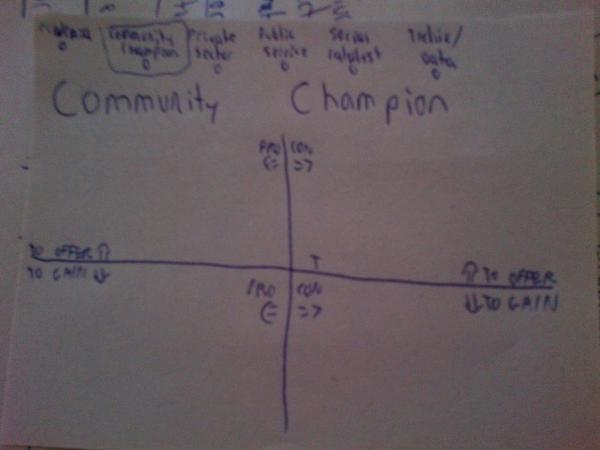
Let's be clear from the outset - Kathleen Wynne is no Superwoman. She is a mortal human being with strengths and weaknesses, abilities and limitations like the rest of us. It's as naive to assume she can single-handedly solve Ontario's problems as it is to blame her for them.
So why the Superman analogy? We'll get to that in a bit.
First, Wynne. What sets her apart as a leader is that she has never tried to portray herself as the Woman of Steel. She has never suggested she's got all the answers, nor has her team ever said only she can prevent forest fires. In fact, this "I'm not the answer, but I will be a conduit" narrative has been part of her identity her entire career.
When Wynne says "move forward together", she means it.
This is not common in politics. There's a reason for this, of course - in any electoral race, only one person can win a nomination, a seat, a leadership or the responsibility of being Premier. Winning is all about beating the other folk, which in politics tends to translate into "I'm the path to salvation/they are the path to damnation" framing. If you turn the other cheek to your opponents, they'll smile as they step on your throat.
Tim Hudak was a great example of this kind of politicking; he constantly protrayed himself as Stern Father, the man with the plan, the Master of Political Kung Fu, the only one who could fix everything if we'd just give him the keys to the Premier's Office. Hudak relished a good fight, as did his team - as do most political operatives.
For them, politics is a bloodsport, the grand arena; they love epic contests, battles of skill and fortitude. There's nothing they relish more than dining on the ashes of their opponents on the field of victory.
Which brings us back to Superman.
Faced with some public criticism of the massive devastation Metropolis faces in the Man of Steel movie, direct Zack Snyder has said:

For Synder, Superman is an American stand-in for a Ronin or a demi-God like Heracles or Perseus. The wanton destruction of property and loss of live was necessary to give Superman the scope and scale of a mythological hero.
That's fine, I guess, for a movie, but it's really not a constructive way to build brand in the real world. Yet that is what the political fighters out there subconsciously are trying to do.
I've argued before that a great number of War Room operatives see themselves as modern superheroes (
like a James Bond), all that stands between us and oblivion. This is in no small part a narrative that feeds their ego; the more important you are, the greater the stakes are in your actions - and as such, the more of everything you deserve to have for being the superhero.
There are psychological underpinnings to this mentality that are hard-wired into our species; think Alpha Male getting all the best food and the best pick of mates for being the guy who keeps threats at bay. Of course there are other males that want that privilege, so are constantly looking for ways to bring down the Top Dog, leading to internal competitions.

Chest-thumping gorillas, deer antlers, peacock's tails and narcissistic personalities are all genetic variances on the same theme. Our cognitive capacity has simply allowed us to blow up this narrative to epic, god-like proportions, with some casting themselves in the role of the Alpha and doing what it takes to get there.
Thing is, Superman has never been the Alpha male - he's never sought power, prestige or fame. As such he's never felt the need to be at the centre of glorious, epic battles the way a samurai, demi-gods or super-spies have.
Superman has never been about himself - he has been a symbol for the better angels of our nature. He is more often portrayed as a mythical equivalent to a Jesus rather than a Heracles. As an outsider, he has been distinct, therefore not tied to the same drives as the rest of us. As a being of unmatched power, he's never needed to fight for title or dive into epic, destructive battle to prove his superiority.
In the words of Chronicle scribe Max Landis, Superman has always been the the adult in the room.

Landis has a great rant in which he articulates why he has no problem with Superman killing one person, if that's what it takes to save many, but takes issue with the fact that Supes allowed his epic battle to ravage his home town and the entire city of Metropolis.
Instead, Superman should have drawn the fight away from populated areas, away from earth even to ensure the minimum amount of damage to others.
Superman isn't interested in the win; he's interested in the public good. That's his difference; that's what makes him special. It's also why a guy like Lex Luthor, who strives to be the Alpha, loathes the Man of Steel as he does.
Lex Luthor may become the wealthiest business man, the master of the criminal underworld, even the President of the United States, but he can never beat Superman, and that's what fuels his hatred of his nemesis.
So how does a guy like Superman defeat an implacable foe like Lex Luthor?
We go back to Kathleen Wynne.
Wynne, again, is no demi-god, no superhero, no saviour. What she is, though, is a leader. Leaders differ from Alphas in that they put the people before themselves, always.
When she won the Liberal Leadership, Wynne immediately reached out to her former rivals to find ways they could move forward together. Others may have gloated, kicked Wynne loyalists out of the Party and claimed victory; Wynne immediately started to go back to work.
Even as her "defeated foes" continued to pick at her, trying to demonize and bring her down, force her to play at their level, Wynne has always remained the leader. She works with everyone who's willing and always leaves the door open for those who aren't.
Faced with an implacable foe, Wynne does what the best of leaders do - put the people first. If a "foe" of hers has a success, she recognizes it. When she herself makes a mistake, she recognizes that, too. The focus is never on bringing others down or making oneself bullet-proof - it's always, always on moving forward together.

In a Legislature that is often fractious and full of over-the-top personalities trying to portray themselves as super champions in epic combat, Wynne continues to be the adult in the room. Does she slip sometimes? Of course she does - she's human. But
she never gives up, never stays down - and she's winning converts as a result.
Instead of trying to bring her down or demonize her, Wynne's "foes" would do well to learn from her example and start leading themselves.
If our politicians can pull together and focus on fixing the province, just think what kind of message that would send to the rest of us.






